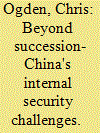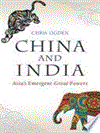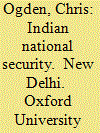|
|
|
Sort Order |
|
|
|
Items / Page
|
|
|
|
|
|
|
| Srl | Item |
| 1 |
ID:
118140


|
|
|
|
|
| Publication |
2013.
|
| Summary/Abstract |
China is undergoing a transitional period of rapid economic and social development. The way in which this period is managed will hold significant implications for the Chinese state concerning both its internal and external security. While fundamentally resting upon progressing from a developing to a developed economy, this transition highlights deep issues and tensions affecting China-ranging from rising societal inequalities to various separatism threats to mounting individualism. Regardless of internal succession struggles within the Communist Party of China (CCP), it is critical to focus upon this multitude of (mounting) social and economic issues-particularly outside of the political realm-that China's new leaders will have to face. Here, we highlight three themes central to this transition-a search for internal stability; China's multiple, interlocking internal issues; and the longevity, resilience and adaptability of the CCP-in order to assess their potential impact on China's domestic and, critically, external politics.
|
|
|
|
|
|
|
|
|
|
|
|
|
|
|
|
| 2 |
ID:
153210


|
|
|
|
|
| Publication |
Cambridge, Polity Press, 2017.
|
| Description |
ix, 213p.: tablespbk
|
| Standard Number |
9780745689876
|
|
|
|
|
|
|
|
|
|
|
|
Copies: C:1/I:0,R:0,Q:0
Circulation
| Accession# | Call# | Current Location | Status | Policy | Location |
| 059106 | 327.51/OGD 059106 | Main | On Shelf | General | |
|
|
|
|
| 3 |
ID:
185652


|
|
|
|
|
| Summary/Abstract |
As Asia’s largest and most rapidly rising powers in contemporary global politics, relations between India and China are becoming evermore intertwined with each other. Clear commonalities typify this symbiosis, including a shared civilisational basis, a mutual desire to rebecome great powers in international relations and common modernisation goals. At the same time, relations are beset by a number of issues, most notably long-standing territorial disputes, frictions over regional hegemony and wider diplomatic tensions (most prominently relating to China–Pakistan and India–United States ties). As such, India–China relations can be considered to resemble a ‘double-edged sword’, whereby elements of their interaction can be regarded as having concurrent benefits and liabilities. This article explores the historical roots and contemporary realisation of such a core dynamic over the last 75 years of relations between New Delhi and Beijing and investigates how their strategic goals are often simultaneously convergent and divergent.
|
|
|
|
|
|
|
|
|
|
|
|
|
|
|
|
| 4 |
ID:
190749


|
|
|
|
|
| Summary/Abstract |
Central to India–ASEAN relations have been a consistent equivalence between their similar core principles and outlooks, which have served as a shared value-based footing upon which the two entities have built and enhanced their relations. These underlying sets of norms inform their diplomatic dealings with each other, and stem from principles and practices critical to their foundational identities and experiences. This article investigates and evaluates the historical roots of these norms and then utilizes them as an analytical vehicle with which to trace the growing strategic convergence typifying present-day India–ASEAN relations. Drawing upon constructivist accounts that emphasize the role played by history, culture, identity and learning, the article considers the key areas of agreement in relations, and how a value-based form of analysis provides an essential lens through which to better understand material factors structuring their relations. It also underlines the analytical value and empirical richness that a norm-based approach provides for analyzing specific sets of norms in a specific state-to-multilateral interaction.
|
|
|
|
|
|
|
|
|
|
|
|
|
|
|
|
| 5 |
ID:
160283


|
|
|
|
|
| Publication |
New Delhi, Oxford University Press, 2017.
|
| Description |
xxvi, 152p.pbk
|
| Series |
Oxford India Short Introduction Series
|
| Standard Number |
9780199466474
|
|
|
|
|
|
|
|
|
|
|
|
Copies: C:1/I:0,R:0,Q:0
Circulation
| Accession# | Call# | Current Location | Status | Policy | Location |
| 059486 | 355.033054/OGD 059486 | Main | On Shelf | General | |
|
|
|
|
| 6 |
ID:
096825


|
|
|
|
|
| Publication |
2010.
|
| Summary/Abstract |
How do national and political identities impact on a state's foreign policy? In turn, how does the analysis of different normative beliefs advance our understanding of India's foreign policy during the National Democratic Alliance (NDA) period? This article utilises a norm-based approach to investigate the composite entrenched beliefs underpinning Indian foreign policy. Such an approach generates historically contingent understandings of foreign policy beliefs across different political generations and ideologies. By focusing on pre-1998 Indian government and Bharatiya Janata Party (BJP) foreign policy norms, and comparing them with the actions of the BJP-led NDA in government, the paper assesses whether differing ideological beliefs either constrain or influence (Indian) foreign policy. In particular, two elements of Indian foreign policy are analysed-dealing with Pakistan and going nuclear-in order to evaluate continuity and change in the formation and development of foreign policy in India. It is found that although the BJP-led NDA were frequently constrained by underlying norms present in Indian foreign policy, their own established policy beliefs often challenged these norms and influenced new foreign policy directions.
|
|
|
|
|
|
|
|
|
|
|
|
|
|
|
|
| 7 |
ID:
117892


|
|
|
|
|
| Publication |
2013.
|
| Summary/Abstract |
This article investigates how a Pakistan-terrorism nexus originated and then became solidified and embedded into Indian security perspectives. From the First Kashmir War in 1947-1948 to the 26 November 2008 Mumbai attacks, it has been the repeated behaviour of Pakistan towards India, and the nature of their major national and sub-national conflicts, which has led to this nexus. Central to its formation has been the repeated military strategy of initial infiltrations by irregular troops followed by the use of conventional troops-an approach employed by Pakistan in 1947, 1965 and 1999. Pakistan's concurrent support of various insurgencies and terrorism against India has compounded this association, and entrenched the contemporary Pakistan-terrorism nexus within India's (foreign and domestic) security perspectives. Given its persistent resonance within both Pakistani strategic behaviour and Indian elite mindsets, the article finds that the Pakistan-terrorism nexus will remain as a durable and critical lynchpin within South Asian security dynamics.
|
|
|
|
|
|
|
|
|
|
|
|
|
|
|
|
|
|
|
|
|